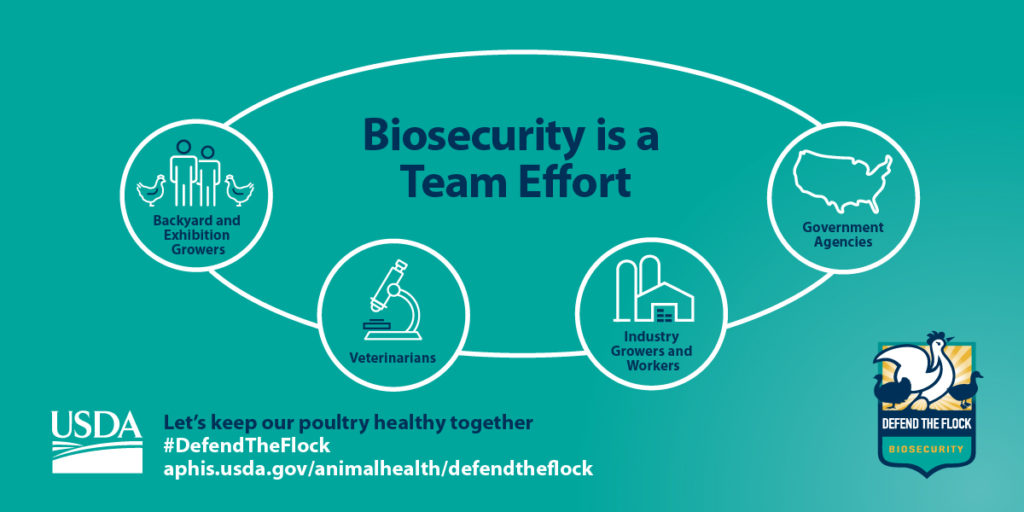Biosecurity
go.ncsu.edu/readext?66796
en Español / em Português
El inglés es el idioma de control de esta página. En la medida en que haya algún conflicto entre la traducción al inglés y la traducción, el inglés prevalece.
Al hacer clic en el enlace de traducción se activa un servicio de traducción gratuito para convertir la página al español. Al igual que con cualquier traducción por Internet, la conversión no es sensible al contexto y puede que no traduzca el texto en su significado original. NC State Extension no garantiza la exactitud del texto traducido. Por favor, tenga en cuenta que algunas aplicaciones y/o servicios pueden no funcionar como se espera cuando se traducen.
Português
Inglês é o idioma de controle desta página. Na medida que haja algum conflito entre o texto original em Inglês e a tradução, o Inglês prevalece.
Ao clicar no link de tradução, um serviço gratuito de tradução será ativado para converter a página para o Português. Como em qualquer tradução pela internet, a conversão não é sensivel ao contexto e pode não ocorrer a tradução para o significado orginal. O serviço de Extensão da Carolina do Norte (NC State Extension) não garante a exatidão do texto traduzido. Por favor, observe que algumas funções ou serviços podem não funcionar como esperado após a tradução.
English
English is the controlling language of this page. To the extent there is any conflict between the English text and the translation, English controls.
Clicking on the translation link activates a free translation service to convert the page to Spanish. As with any Internet translation, the conversion is not context-sensitive and may not translate the text to its original meaning. NC State Extension does not guarantee the accuracy of the translated text. Please note that some applications and/or services may not function as expected when translated.
Collapse ▲Defend the Flock
from the press release
The United States Department of Agriculture’s (USDA) Animal and Plant Health Inspection Service (APHIS) has expanded its Defend the Flock program to educate all poultry growers about best practices in biosecurity.
This comprehensive public education program provides new resources to ensure that all growers have the information they need to keep flocks safe from infectious diseases.
APHIS is introducing the expanded program to combat the increasing risk of serious disease outbreaks. Biosecurity, which encompasses structural and operating practices to block diseases and the pathogens that carry them, has proven to be the most effective way to protect the nation’s poultry, property, and people.
The Defend the Flock program includes checklists, videos, and other resources that reflect the knowledge, insights and experience of USDA, veterinarians, poultry owners, growers, scientists and other experts. All Defend the Flock materials are available at no charge 24/7 at the Defend the Flock Resource Center. For more information on the program, visit Defend the Flock.
Defend the Flock biosecurity checklist
USDA APHIS provides a checklist for proper cleaning and disinfecting poultry enclosures.
Defend the Flock on social media
Follow Defend the Flock on Facebook and Twitter for practical tips about keeping poultry healthy and new additions to the Resource Center.
Foreign animal diseases
Highly pathogenic avian influenza and virulent Newcastle disease are both foreign animal diseases (FAD). This means that these viruses are not present in United States poultry and when encountered eradication is the goal of efforts to contain the disease.
Clinical signs for these viral infections can be identical so laboratory diagnosis is needed to confirm infection due to either virus.
Clinical signs for these two viruses may include
- respiratory signs with secretions from the eyes, nares and mouth.
- Birds may have diarrhea and/or be unable to stand.
These viruses can cause high mortality in infected flocks.
If you see clinical signs in your birds that resemble those associated with HPAI or VND call the North Carolina Department of Agriculture and Consumer Services at: 919.707.3250 to report this as a potential foreign animal disease and wait for help with diagnosis and further instructions.
Manual from NC State Extension
You can download the Poultry Farm Biosecurity Field Manual / Manual de campo para la bioseguridad de granjas avícolas manual to help with your biosecurity planning.
The manual is presented in English and Spanish.
Faculty experts (media)
Dr. James S. Guy – Professor of Poultry Health Management (CVM).
Dr. Matthew D. Koci – Professor — Immunology, Virology and Host-Pathogen Interactions (CALS).
Dr. Edgar Oviedo – Professor — Broiler Nutrition and Management (CALS).




